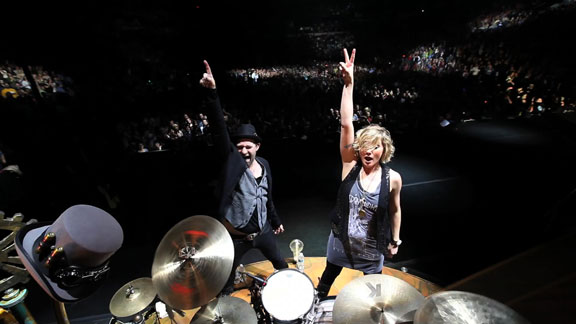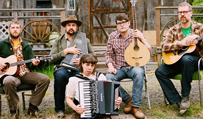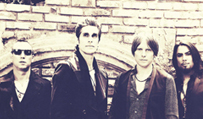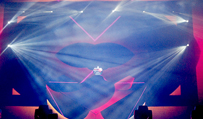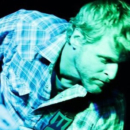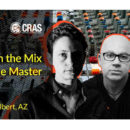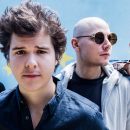By Dan Kimpel
Photo by: Valarie Allyn Bienas
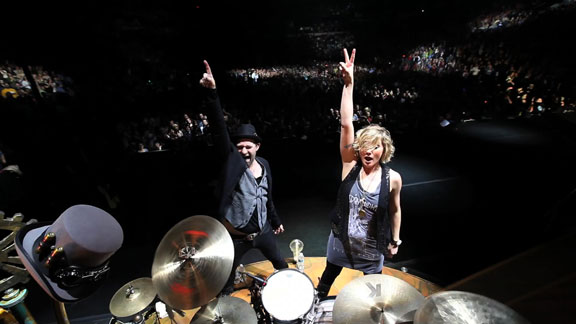
Since their recorded debut in 2004, Sugarland have blazed remarkable inroads across the terrain of modern country music. Multiple Grammy, CMA and ACM awards and sales of over 10 million records are proof positive of this act’s massive appeal.
With The Incredible Machine, the duo of Jennifer Nettles and Kristian Bush topped both the Billboard Country Album charts and the all-genre Billboard 200. The CD’s musical reference points are wide-ranging and unexpected: dancehall and reggae for the single, “Stuck Like Glue,” power pumping rock on “All We Are,” and the clockwork syncopation of the title track. But country roots are always attached, as the expressive intimacy of the song suite’s closing track, “Shine The Light” handily demonstrates.
On a recent afternoon, the famed Greek Theatre in the hills of Los Angeles, CA’s Griffith Park is bustling with an air of preparation and anticipation: gaggles of stagehands mill about, props are set up and equipment is tested. It is mere hours until show time for the first of two sold-out nights in the 6,000+ seat amphitheater, but Jennifer Nettles and Kristian Bush are relaxed and gracious hosts. In the hushed, candle-scented confines of a band tour bus, they sit down with MC for this exclusive interview.
Music Connection: In researching your individual and collective histories, it’s obvious that you were both singer-songwriters long before you were country superstars.
Jennifer Nettles: We still consider ourselves shaped, formed and molded by singer-songwriter culture, even in terms of how we fit into the tapestry that is Nashville.
MC: That said, in Nashville it is more common to encounter artists who record songs written by the famed stable of amazing songwriters. So how does Sugarland fit into that?
Nettles: We are different in that way. This is not to say that other country musicians don’t write; some do, some don’t. There is already such a well-established and deep history in Nashville of the songwriter who isn’t the artist. To have come from a singer-songwriter background first was an interesting introduction into that community.
MC: Does this give you more freedom to expand on the conventional song form, and to include the elements that we hear on The Incredible Machine?
Nettles: We are given more freedom, depending on how you look at it. Radio is still radio. But I think coming onto the scene being very authentically who we are as singer-songwriters, we weren’t expected to change and suddenly fit into a mold.
Kristian Bush: There are very few people who, as songwriters, are given both the attention and the opportunity. To know that radio is going to hear our single whether they want to play it or not, gives us the opportunity to push.
MC: Are there specific limits on what radio will play?
Nettles: The truth of the matter is this: we are singer-songwriters who came into mainstream radio through country radio. Now don’t get me wrong: I will forever be grateful to country radio for doing that, but at the same time a leopard can’t change his or her spots. What that does is push people, to provoke them; because sometimes it doesn’t fit what they’re thinking a radio friendly country musician should be in the mainstream. If we can get over here and push it, then we can get them excited.
MC: For The Incredible Machine, the songs are arena-ready, with massive choruses. Was this an element of the construction of the songs and sounds that was premeditated?
Nettles: We put on our songwriter hats very consciously for this record. And we knew that in order to have that call-and-response empowerment, to have this grandeur and anthemic quality translate through the speakers, everything had to be simplified; from the choices of parts that each musician played through the melody to the lyric.
Bush: It’s like clothes to put on. You think you paint with one color, but to use that metaphor, what you end up with is a particular shade that is just usРРnobody else can know how to paint it. When we go into a song like “Incredible Machine,” it is vague in its description. It tells you about a narrative in which you have no touch point, but the emotion has every touch point so it’s accessible. You want to know about that mystery, even though you don’t understand it.
MC: Your fans certainly seem to get it.
Nettles: It’s a tribe, a culture. That’s the live music fan, not only ours, but audiences being microcosms of that on individual nights. Being able to go out and see the fans and celebrate them is a mutual experience.
Bush: The recent record has knocked down the walls more than any of the others so far. The performance of this record has got a little bit of Rocky Horror Picture Show in itРРus saying to the audience, “This is your part.” We went into it performance wise. A couple of years ago we got into the “Flaming Lips Balls” and rolled around. When you don’t know what’s going to happen next in rock & roll is when it’s rock & roll. Is David Lee Roth really going to punch that guy? He’s not. Is he really going to sleep with his girlfriend? He might!
I still buy it. And that’s when you know you’re in a live moment. Our new record has a lot of “We sing, you sing; this is your life, this is our life. It’s your music and our music.”
MC: We see that on the bus you have an old-school turntable and a stack of vinyl records with The Police debut LP on top. What else are you listening to?
Nettles: Bon Iver, Matt Nathanson; we toured with Matt and have a song, “Run,” together with him on his record. Also, Fleet Foxes.
MC: The Incredible Machine, and its predecessor, Love on the Inside, were both recorded in Atlanta as opposed to Nashville. How did this locale alter the experience of recording?
Nettles: It’s what we know because we’re from Atlanta. And it was refreshing for the musicians who came from Nashville to play on the record. It was fun for them, because they’re used to being there, doing different sessions throughout each day with different artists.
This was a much more focused “workshop” type of feel, where they could come and retreat and get away and be solely focused on this record. It becomes the recording of an event of these musicians playing these songs in the same room. It is the only time it will be recorded that way.
Other musicians might come in and play it completely differently. Or the same musicians might come in on a different day and play it in another way. As artists, we start to inform ourselves as we move through it.
MC: Did you give the musicians specific guidelines, or write out the parts?
Bush: It’s not a band who dreamed and wrote together. It’s just the two of us who flushed it out to some degree, so we needed the musicians to steep in us for as long as they could and then they would start to make choices, “Oh, that’s what you’re looking for.”
There is an old adage of recording that says whatever song you track first, also track it last, so you will hear what the album is supposed to be. Because the way you approach it blank is not the way you approach it once you’ve walked all the way through the process. It’s similar when you isolate musicians like that.
MC: The album follows an intricate narrative sequence. How was this achieved?
Bush: Sequence is important to me. It’s like the sequence of the show. I think you go on a journey and you tell a story, and I love how songs surprise me when I couldn’t control it. In digital culture, people control the sequence a little more. I think sequencing is falling by the wayside.
MC: Jennifer, you recently returned to Agnes Scott College in Decatur, GA, for their 40th Annual Writers Festival. Tell us about that.
Nettles: I went back to my alma mater to share my craft as a songwriter. And in shaping that presentation, I was able to give actual terms and see on a piece of paper my own process. I had never sat down to think it out in that way. It was interesting to do. I learned a lot. I think everyone should experience thatРРtelling people how to do what you do. It is one thing to come up with a product, whatever that might be, a song, a book, or a gadget, but it’s another thing to explain how you did that. As far as art is concerned it’s the beauty of the ether, and that other experience, but to recognize patterns in yourself is interesting.
“Songs that really land with the most importance are the ones that resonate with the person singing them. Write with the artist if you have the chance.”
MC: Do you write on the road?
Nettles: We’ve written on buses, backstage, in hotel rooms, in studios, wherever.
Bush: Give us a corner and say, “We need a song for this movie,” and we’ll say, “Okay, give us an hour.” ... We’ve been doing it so long that we have ease and fluidity.
MC: How does this work when you bring in an outside collaborator?
Nettles: Kristian has been sharpening his blade and branching out with other people.
MC: Kristian, have you worked with Los Angeles-based co-writers either solo or with Jennifer?
Bush: We’ve written with some people who work here: Matthew Wilder and Kevin Griffin (Better Than Ezra), but Kevin now lives in Nashville. It’s different.
We also don’t have time to camp out in California. It’s more like the urban R&B world in Atlanta, where they will lock themselves in the studio for two weeks. What’s beautiful to me is learning over and over that the songs that really land with the most importance are the ones that resonate the most with the person who is singing them. Write with the artist if you have the chance.
MC: You both co-wrote “Run” with Matt Nathanson for his album Modern Love. How was the writing different with him involved with the two of you?
Bush: His process is so different, but he was so courageous and trustworthy. He’d been out on the road with us, and the momentum pulled us into the studio. But it looked like he was watching tennis: as we’d go back and forth with “Yes, no, yes, no.” Then he went and hibernated and came out with the song.
MC: For this tour, your opening acts are Casey James, who our readers might know from American Idol, and formerMC cover story subject, Sara Bareilles. Did you choose them to accompany you for the shows?
Nettles: Yes we did. Sara is an amazing writer, singer and personality. I feel like we have such a diverse audience anywayРРa lot of them know Sara, but for those who don’t, there’s joy of discovery. s
MC: Jennifer, your voice is such a powerful instrument. Do the physical rigors of touring challenge you?
Nettles: AbsolutelyРРsleeping on a bus is hard. It’s very different to sleep when you’re moving as opposed to sleeping in a stationary bed. The voice is your instrument, but it’s also your body, and it has to heal like any other muscle would. Having done it all these years gets it conditioned, but there was a learning curve to keep me in the best vocal health.
MC: Do you have days off between shows?
Bush: Country music tours are different from rock. We tour three days a week, plus one day out and one day back. So we’re home on the other days.
Nettles: Listen, I have to make lifestyle choices that would seem to some people as sacrifices. In some ways they are. I don’t get to whoop it up and have a rock star life after the show. We’re not partying. I can’t drink. I can’t have my coffee in the morning; I have green tea, because coffee is acidic and messes with my refluxРРbut it’s worth it to be able to do what I love.
Contact Kelly Russell
*** This MC interview was conducted two weeks prior to the tragic accident at the Indiana State Fair, where a stage collapse killed 6 Sugarland fans and injured 40. At press time the band was planning a memorial event to honor its fallen fans.

